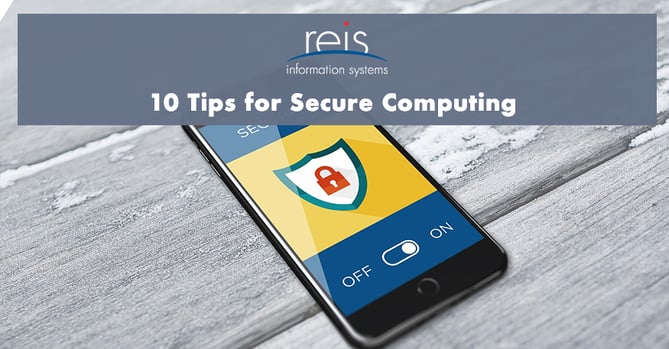The world is constantly changing, and security online is becoming more important. Keep reading to see our tips for staying safe.

In the past we have talked about staying safe online and how you can do that. We thought we'd make another post for more tips for secure computing.
Curious to see some cyber-attacks from the last decade that sparked change? Read more here.
Below are our 10 tips for secure computing.
1. You're a target to hackers
Never say that it won't/can't happen to you. Everyone is at risk and the consequences are high. Whether this is for your personal life, financial well-being, work security, and reputation.
2. Keep all software up to date
Something you should always keep up to date is software. Installing updates for applications and operating systems is critical.
3. Avoid phishing scams - be aware of emails and calls that are suspicious
These types of threats are constant. They can be carried out by cyber criminals who will try to get your personal information (for example, logins, passwords, banking information). These attacks can be orchestrated by phone, text, email, and/or social media. Make sure to be suspicious of any official-looking messages or calls that ask for personal information.
4. Practice good password management
We all have too many passwords. It's easy to take shortcuts; this could be reusing the same password. A password management program can help with creating strong and unique passwords for all accounts. Programs such as these will generate strong passwords, enter the credentials automatically, and remind you to update passwords periodically.
Here are a few tips: Use long passwords (20+ characters); mix of characters; use different password for every site; don't share passwords and don't write them down; update passwords regularly (every 6 months or 90 days).
5. Be careful on what you click
Avoid going to websites that you don't know and don't download software from sources you don't trust. Unknown site often have malware that will automatically and silently compromise your device.
If attachments or links in are unexpected or suspicious, don't click on it.
6. Don't leave devices unattended
The physical security of your device is just as important as the technical security.
If you need to leave any device for some time, lock it. Also, if you have sensitive information on a USB drive or external hard drive, keep these locked. Another think to keep in mind is to always use encryption when storing or transmitting data.
7. Protect sensitive information
Be aware of all of the sensitive data that you come in contact with. Make sure to keep sensitive data off of your devices, remove sensitive data files from your system when they're no longer needed, always use encryption.
8. Use mobile devices safely
We rely heavily on mobile devices , and they are vulnerable to attacks. Here are some tips:
- Lock with a PIN/password
- Don't leave it unattended in public
- Install apps from trusted sources
- Keep the OS updated
- Don't click on links or attachments that aren't expected
- Avoid sending and/or storing personal information
- Backup data
- Use tools to help prevent loss or theft
9. Install anti-virus protection
Install anti-virus from a known and trusted source. Make sure to also keep virus definitions, engines, and softwares up to date to make sure that the anti-virus program stays effective.
10. Back up your data
Make sure to back up everything regularly. If you happen to be a victim of a security incident, the only way to repair a device is to erase and reinstall the system.
Here are a few more tips to keep you safe online:
- Use a firewall
- Use public Wi-Fi wisely
- Be thoughtful of what you plug into your computer
- Be careful of what you share on social media
- Monitor accounts for suspicious activity
- Bank and shop online on trusted devices and networks
Hopefully you have been able to learn tips on how to have secure computing. If you have questions or comments, use the section below.
Want to see how we helped a client in the Manufacturing industry? Read our case study below.
Sources:
UC Berkeley. (2020). Top 10 Secure Computing Tips. Retrieved Feb. 4, 2020 from, https://security.berkeley.edu/resources/best-practices-how-to-articles/top-10-secure-computing-tips



.png?width=1080&name=GOOGLE%20REVIEW%20(1).png)